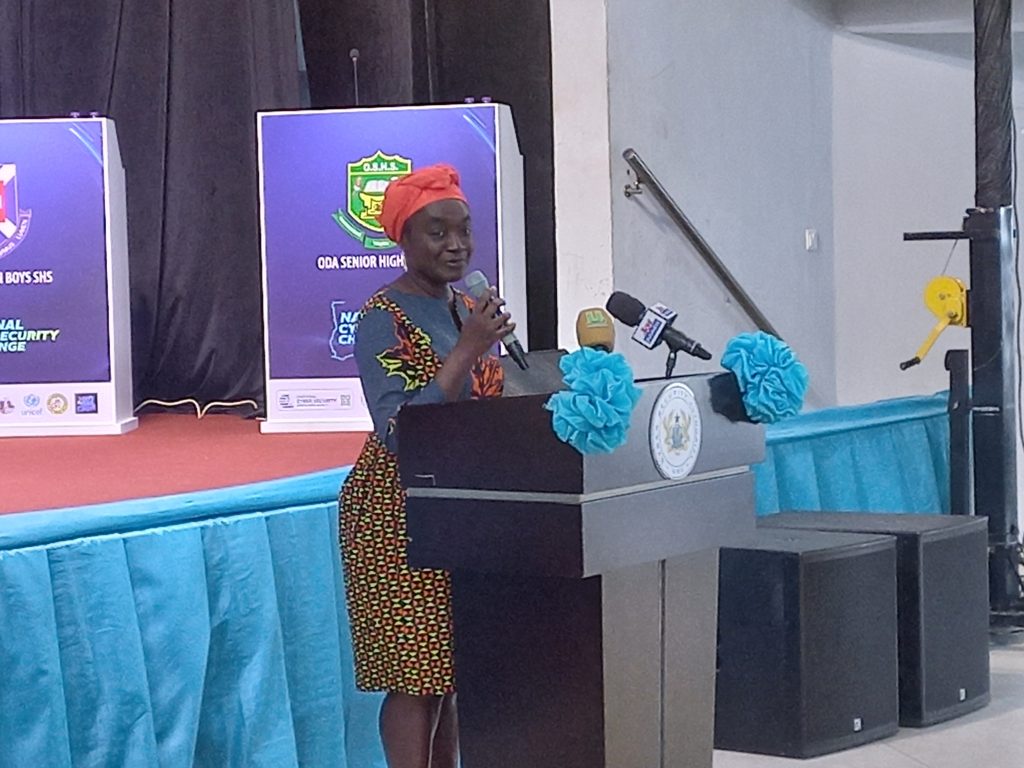By Priscilla Oye Ofori
Accra, Oct. 17, GNA – Some 125,000 Senior High School students since 2018 have been trained on cybersecurity in Ghana.
The training is part of the awareness creation programmes of the Ministry of Communications and Digitalisation through the Cyber Security Authority (CSA) and other partners.
Madam Ama Pomaa Boateng, Deputy Minister of Communications and Digitalisation said this at the maiden edition of the National Cyber Security Challenge in Accra as part of activities to celebrate CyberSecurity Month.
CyberSecurity Month is instituted to raise awareness for the citizenry to develop a cybersecurity culture and stay safe whilst using digital technologies to develop and enhance their way of life.
Madam Boateng noted that awareness creation was identified as the most effective medium to address cybercrime issues worldwide.
Hence, she said Government through the CSA institutionalised the National Cybersecurity Awareness Month for Ghanaians.
“We have achieved some successes, especially in raising awareness of the online risks associated with contact with our children on the internet, the conduct of children and young people on the internet, which could harm other children as well as the contents which children access on the internet,” the Deputy Minister said.
Madam Boateng stated that Ghana’s internet penetration rate currently stood at 53 per cent of the total population, including children, who were susceptible to threats such as cyberbullying, exposure to indecent images and videos cyberstalking, phishing attacks and sextortion.
The protection of children, vulnerable among society, she said, was at the forefront of the Government’s national cybersecurity efforts.
The Deputy Minister said as part of the Government’s commitment to protecting children and the entire cyberspace from criminal activities, the Safer Digital Ghana Awareness Programme was launched in 2018, with a focus on Children, the Public, Businesses and Government.
In partnership with UNICEF-Ghana, Ghana currently has an agreement with the Internet Watch Foundation (IWF) concerning reporting of child online cases and the IWF portal, linked to CSA’s Cybercrime/Cybersecurity Incident Reporting Points of Contact (PoC).
It was launched on October 1, 2019, to allow the public, including children to report abuse and cybercrime cases and to receive advisories.
Dr Abert Antwi- Boasiako, Acting Director General, CSA, said it was the collective responsibility of law enforcers, parents, guardians and teachers to protect and secure children from all forms of abuse, including those online.
He noted that the increasing access to the internet presented unparalleled opportunities for children and young people to communicate, connect, learn and access information from various parts of the world, however, it came with new security challenges.

Dr Antwi- Boasiako assured CSA’s commitment to protecting the interests of children online in line with its mandate to regulate and promote the development of cybersecurity in the country.
“The Cyber Security Authority is putting in place the required structures to create a safe digital ecosystem for the children of Ghana, but the greater responsibility lies on parents, teachers and the children themselves,” the Acting Director General stated.
GNA